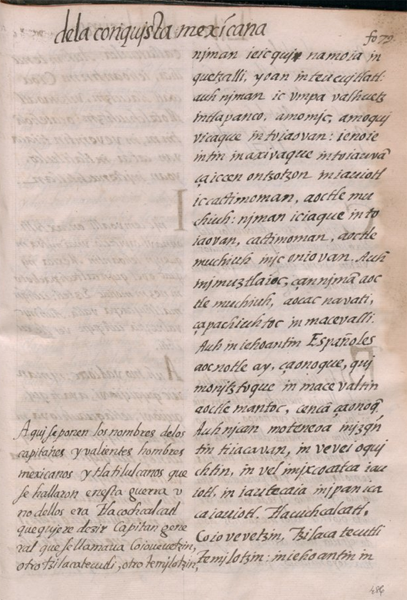Folio 79 recto
Translations and Transcriptions
Spanish Translation
[Translation of the Nahuatl into Spanish by Fr. Bernardino de Sahagún; transcription of the Spanish (left-hand column) by James Lockhart:] [f. 79r.] nombres de los capitanes y valientes hombres exicanos y tlatilulcanos que se hallaron en esta guerra vno dellos era Tlacochcalcatl que quiere dezir Capitan general que se llamaua Coioueuetzin, otro Tzilacatecutli, otro Temilotzin,
English Translation
[Translation of the Nahuatl (right-hand column) by James Lockhart:] Then he snatched up the precious feathers and gold and dropped down off the roof. He did not die, and our enemies did not carry him off. Also three of our enemies were captured. At that the war stopped for good. There was silence, nothing more happened. Then our enemies went away. It was silent and nothing more happened until it got dark. And the next day nothing more happened at all, no one made a sound. The common people just lay collapsed. The Spaniards did nothing more either, but lay still, looking at the people. Nothing was going on, they just lay still. Here are mentioned all the warriors, the men of great valor, in whose countenances was war, who directed the battle and presided over it: the Tlacochcalcatl Coyohuehuetzin and the lord of Tzilacan, Temilotzin—these [Translation of the Spanish (left-hand column) by James Lockhart:] names of the captains and brave men, Mexica and Tlatelolca, who took part in this war. One of them was the Tlacochcalcatl, which means captain-general, called Coyohuehuetzin; another Tzilacateuctli, another Temilotzin;
Analytic Transcription
[Transcription of the Nahuatl (right-hand column) by James Lockhart:] [f. 79r.] niman ie ic quinamoia in quetzalli, yoan in teucuitlatl: auh niman ic vmpa valhuetz in tlapanco, amo mic, amo quivicaque in toiaovan: ie no ieintin in axivaque in toiauvā ça ic cen ontzotzon in iauiotl* ic cactimoman, aoctle muchiuh: niman ic iaque in toiaovan, cactimoman, aoctle muchiuh inic oniovan. Auh in imuztlaioc, çan nimā aoctle muchiuh, aocac navati, ça pachiuhtoc in macevalli. Auh in iehoantin Españoles aoc no tle ay, ça onoque, quimonitztoque in macevaltin aoctle mantoc, cencā ça onoq̄. Auh nican moteneoa in izq̄ntin tiiacavan, in vevei oquichtin, in vel imixco catca iauiotl, in iautecaia in ipan icaca iauiotl. Tlacuchcalcatl, Coiovevetzin, Tzilacatecutli Temilotzin: in iehoantin in ---------- *IAUIOTL. This term could be interpreted as meaning the individual battle, but the fact that there was no more serious fighting, and the use of the phrase ic cen 'for good, once and for all, entirely' lead one to think that the whole war is meant.
Image

Spanish Translation
[Translation of the Nahuatl into Spanish by Fr. Bernardino de Sahagún; transcription of the Spanish (left-hand column) by James Lockhart:] [f. 79r.] nombres de los capitanes y valientes hombres exicanos y tlatilulcanos que se hallaron en esta guerra vno dellos era Tlacochcalcatl que quiere dezir Capitan general que se llamaua Coioueuetzin, otro Tzilacatecutli, otro Temilotzin,
English Translation
[Translation of the Nahuatl (right-hand column) by James Lockhart:] Then he snatched up the precious feathers and gold and dropped down off the roof. He did not die, and our enemies did not carry him off. Also three of our enemies were captured. At that the war stopped for good. There was silence, nothing more happened. Then our enemies went away. It was silent and nothing more happened until it got dark. And the next day nothing more happened at all, no one made a sound. The common people just lay collapsed. The Spaniards did nothing more either, but lay still, looking at the people. Nothing was going on, they just lay still. Here are mentioned all the warriors, the men of great valor, in whose countenances was war, who directed the battle and presided over it: the Tlacochcalcatl Coyohuehuetzin and the lord of Tzilacan, Temilotzin—these [Translation of the Spanish (left-hand column) by James Lockhart:] names of the captains and brave men, Mexica and Tlatelolca, who took part in this war. One of them was the Tlacochcalcatl, which means captain-general, called Coyohuehuetzin; another Tzilacateuctli, another Temilotzin;
Analytic Transcription
[Transcription of the Nahuatl (right-hand column) by James Lockhart:] [f. 79r.] niman ie ic quinamoia in quetzalli, yoan in teucuitlatl: auh niman ic vmpa valhuetz in tlapanco, amo mic, amo quivicaque in toiaovan: ie no ieintin in axivaque in toiauvā ça ic cen ontzotzon in iauiotl* ic cactimoman, aoctle muchiuh: niman ic iaque in toiaovan, cactimoman, aoctle muchiuh inic oniovan. Auh in imuztlaioc, çan nimā aoctle muchiuh, aocac navati, ça pachiuhtoc in macevalli. Auh in iehoantin Españoles aoc no tle ay, ça onoque, quimonitztoque in macevaltin aoctle mantoc, cencā ça onoq̄. Auh nican moteneoa in izq̄ntin tiiacavan, in vevei oquichtin, in vel imixco catca iauiotl, in iautecaia in ipan icaca iauiotl. Tlacuchcalcatl, Coiovevetzin, Tzilacatecutli Temilotzin: in iehoantin in ---------- *IAUIOTL. This term could be interpreted as meaning the individual battle, but the fact that there was no more serious fighting, and the use of the phrase ic cen 'for good, once and for all, entirely' lead one to think that the whole war is meant.
Image
